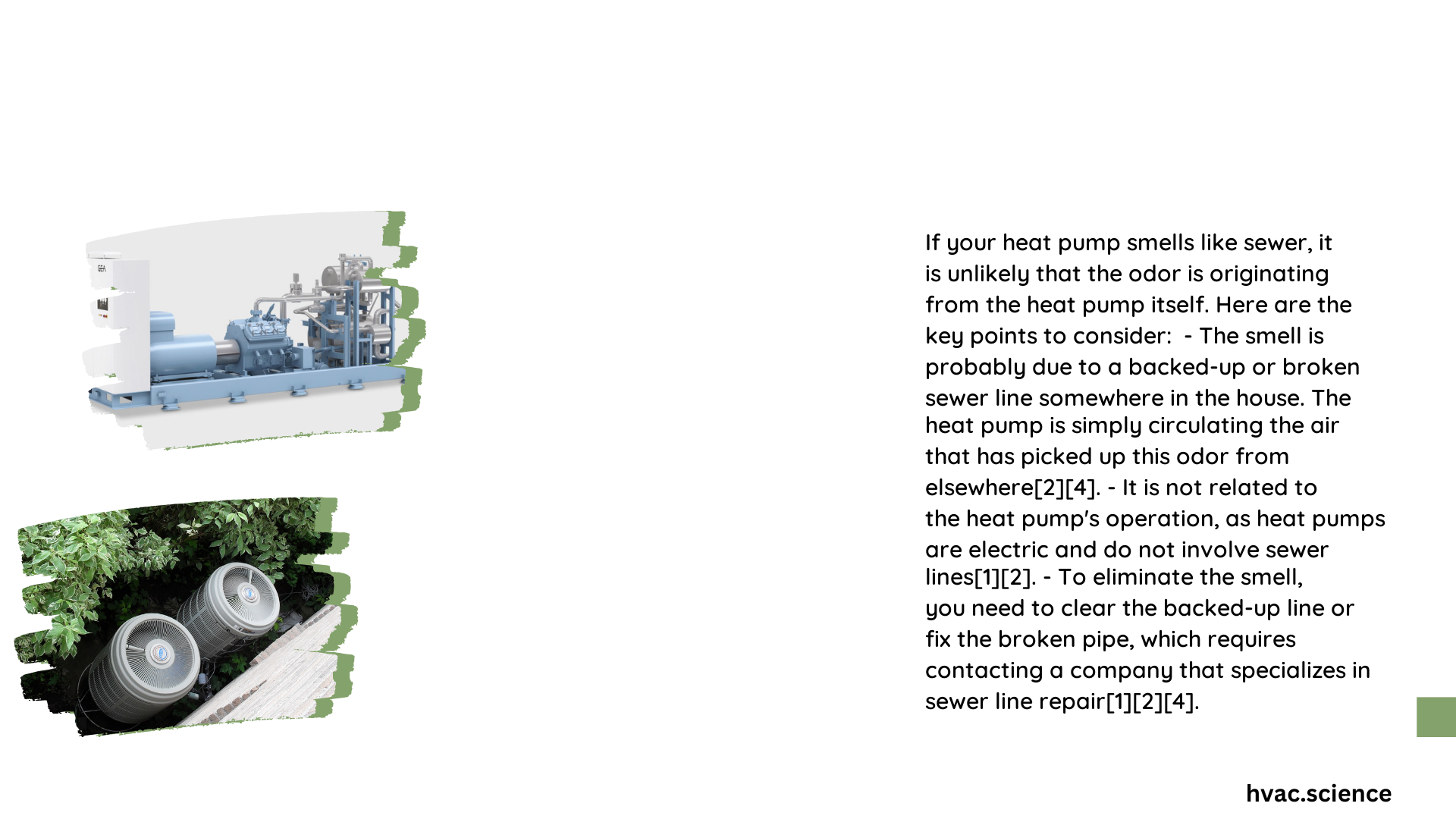A heat pump emitting a sewer-like odor can be a distressing and unpleasant experience for homeowners. This issue often stems from problems within the home’s plumbing or ventilation systems rather than the heat pump itself. Understanding the root causes, implementing effective solutions, and adopting preventive measures are crucial steps in addressing this problem and maintaining a healthy indoor environment.
Why Does My Heat Pump Smell Like Sewer?
The primary reasons for a heat pump emitting a sewer-like odor include:
- Sewer line issues (e.g., backups or broken pipes)
- Plumbing vent problems
- Dry P-traps in floor drains
- Damaged or improperly sealed ductwork
It’s important to note that the heat pump itself is typically not the source of the sewer smell. Instead, it may be circulating the odor from other sources within the home.
What Are the Specific Causes of a Sewer Smell from a Heat Pump?

-
Sewer Line Problems: A broken or backed-up sewer line can release foul odors that may enter your home’s ductwork and be distributed by the heat pump.
-
Plumbing Vent Issues: If your plumbing vents are clogged or damaged, sewer gases can back up into your home and be circulated by the HVAC system.
-
Dry P-traps: Floor drains with dry P-traps can allow sewer gases to enter your home. The heat pump can then spread these odors throughout the house.
-
Ductwork Problems: Damaged or poorly sealed ductwork can allow sewer gases from crawl spaces or other areas to enter the air circulation system.
How Can I Diagnose the Source of the Sewer Smell?
To identify the source of the sewer smell, follow these steps:
- Conduct a visual inspection of visible plumbing fixtures and drains
- Check for any visible damage or leaks in exposed pipes
- Pour water into rarely used drains to refill P-traps
- Inspect the area around your heat pump for any signs of sewage or water damage
- Pay attention to when and where the smell is strongest
If you’re unable to locate the source, it’s best to consult a professional plumber or HVAC technician.
What Are the Solutions for Eliminating Sewer Smells from Heat Pumps?
Here are some effective solutions to address sewer smells associated with heat pumps:
- Repair Sewer Line Issues:
- Have a plumber inspect and repair any damaged or blocked sewer lines
-
Consider hydro-jetting to clear stubborn blockages
-
Address Plumbing Vent Problems:
- Clear any obstructions in plumbing vents
-
Repair or replace damaged vent pipes
-
Maintain P-traps:
- Regularly pour water into floor drains to keep P-traps filled
-
Install water primers for drains that are rarely used
-
Seal and Repair Ductwork:
- Inspect and seal any leaks or gaps in ductwork
-
Replace damaged sections of ductwork
-
Professional Cleaning:
- Schedule a professional duct cleaning to remove any accumulated debris or contaminants
How Can I Prevent Future Sewer Smells from My Heat Pump?
To prevent sewer smells from recurring, consider the following preventive measures:
- Regular Maintenance: Schedule annual inspections for both your plumbing and HVAC systems
- Keep Drains Clean: Regularly clean and maintain all drains in your home
- Use Drain Covers: Install drain covers to prevent debris from entering and causing blockages
- Monitor Water Usage: Be mindful of excessive water usage that could strain your sewer system
- Proper Ventilation: Ensure your home is adequately ventilated to prevent the buildup of odors
What Are the Best Practices for Odor Removal in Heat Pumps?
While the heat pump itself may not be the source of the sewer smell, maintaining it properly can help prevent the spread of odors. Here are some best practices:
- Regular Filter Changes: Replace air filters every 1-3 months
- Clean Condensate Lines: Keep condensate drain lines clear to prevent mold and mildew growth
- Professional Maintenance: Schedule annual professional maintenance for your heat pump
- Use Air Purifiers: Consider using air purifiers with activated carbon filters to help remove odors
- Keep the Area Clean: Maintain cleanliness around the heat pump and its components
When Should I Call a Professional for Heat Pump Odor Issues?
It’s time to call a professional when:
- You’ve tried basic troubleshooting steps without success
- The smell persists or worsens over time
- You notice any signs of sewage backup or water damage
- There are unusual noises or performance issues with your heat pump
- You lack the tools or expertise to safely inspect and maintain your system
A qualified HVAC technician or plumber can conduct a thorough inspection and provide expert solutions to address the sewer smell issue.
By understanding the causes of sewer smells associated with heat pumps and implementing the appropriate solutions and preventive measures, you can maintain a fresh and healthy indoor environment. Remember that prompt action and regular maintenance are key to preventing and addressing these unpleasant odor issues.
References:
1. Boothe’s Heating, Air, Plumbing, Drains & Electrical
2. Logan Inc.
3. Cooper Brothers, Inc.
